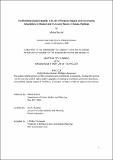| dc.contributor.advisor | Huntley, Eric R. | |
| dc.contributor.author | Shahid, Misha | |
| dc.date.accessioned | 2024-08-14T20:11:43Z | |
| dc.date.available | 2024-08-14T20:11:43Z | |
| dc.date.issued | 2024-05 | |
| dc.date.submitted | 2024-06-28T21:02:34.261Z | |
| dc.identifier.uri | https://hdl.handle.net/1721.1/156156 | |
| dc.description.abstract | As climate change hastens glacial retreat across the world, high mountain communities face increasing risks from glacial lake outburst floods (GLOFs) with limited capacity to mitigate their impact and recover from repeated cycles of losses. This thesis looks at the Hassanabad settlement in Hunza, Pakistan which has faced five GLOF occurrences between 2019 and 2022 to study impact from the f loods, identify differential vulnerability within the settlement and evaluate local adaptation strategies. The study uses a combination of spatio-temporal analysis as well as qualitative field research. Findings indicate that areas closest to the Hassanabad ‘nullah’ (ravine) have suffered immensely from land losses through erosion and continue to be vulnerable to potential occurrences in the future. Field research in Hassanabad proves that community-led disaster risk management (CBDRM) efforts have been central to protecting local residents from the impact of these occurrences. In order to find solutions to the risks facing Hassanabad, the thesis presents five approaches to adaptation that link the remote sensing and community based findings within the region to assess realistic options for the settlement’s future. These include engineering centric solutions such as lake-level lowering and infrastructural adaptation, non-structural efforts such as the deployment of early warning systems (EWS) and community centric approaches that emphasize the role of community-based disaster risk management (CBDRM) and potential relocation of residents to a less risk-prone area. | |
| dc.publisher | Massachusetts Institute of Technology | |
| dc.rights | In Copyright - Educational Use Permitted | |
| dc.rights | Copyright retained by author(s) | |
| dc.rights.uri | https://rightsstatements.org/page/InC-EDU/1.0/ | |
| dc.title | Confronting Glacial Hazards: A Study of Disaster Impact and Community Adaptation to Glacial Lake Outburst Floods in Hunza, Pakistan | |
| dc.type | Thesis | |
| dc.description.degree | M.C.P. | |
| dc.contributor.department | Massachusetts Institute of Technology. Department of Urban Studies and Planning | |
| mit.thesis.degree | Master | |
| thesis.degree.name | Master in City Planning | |
